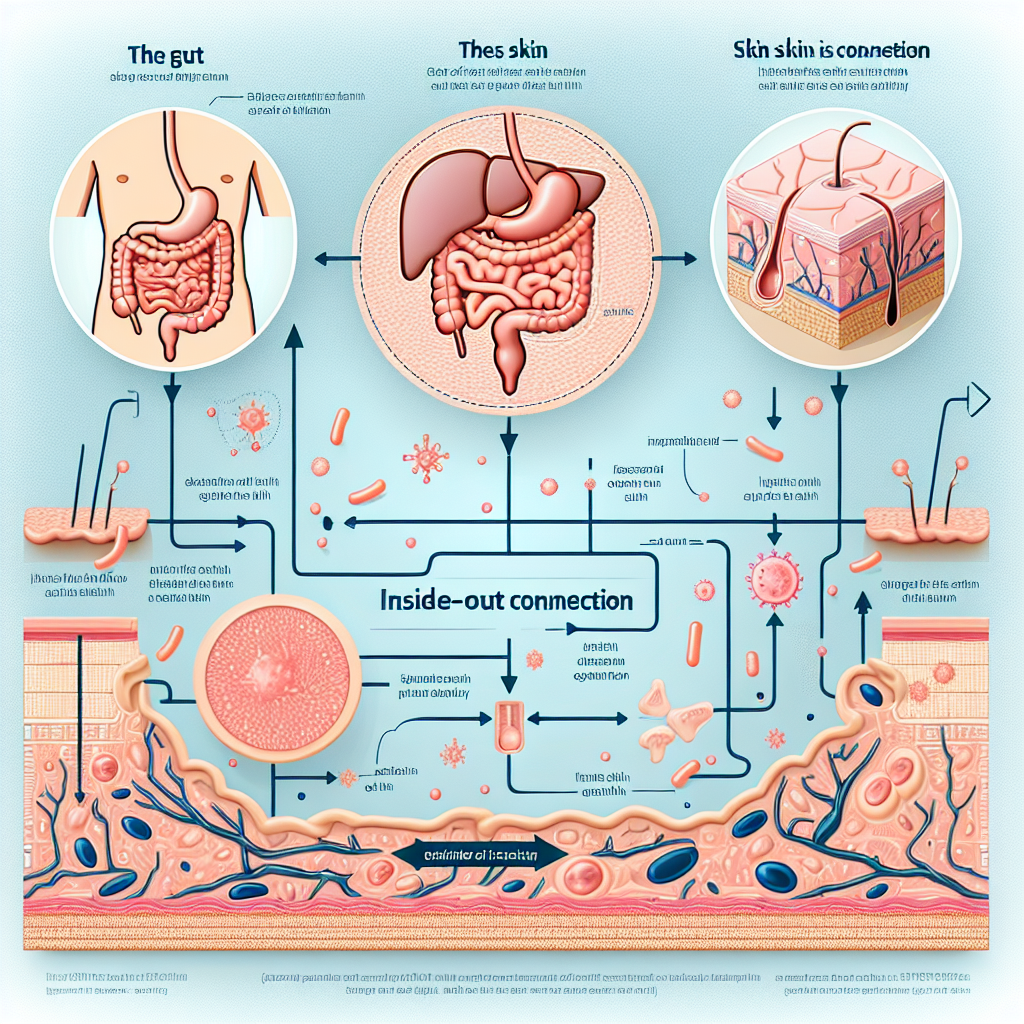How Your Gut Affects Your Skin: The Inside-Out Connection

Discover the powerful connection between your gut and skin health. Learn how to enhance your beauty from the inside out by understanding the role your gut plays in your skin’s condition. Don’t wait, start your journey to vibrant, healthy skin today. Visit My Vibrant Vitality now.
Exploring the Gut-Skin Axis: How Your Digestive Health Influences Your Skin
The human body is a complex network of interconnected systems, each influencing and being influenced by the others. One such connection, often overlooked, is the gut-skin axis, a biological pathway that links your digestive health to the condition of your skin. This inside-out connection is a fascinating area of research, revealing how the state of your gut can have a profound impact on your skin’s health and appearance.
The gut-skin axis is based on the principle that the gut and the skin, two of the body’s largest organs, communicate with each other through various biological and biochemical channels. This communication is facilitated by the gut microbiome, a diverse community of trillions of bacteria and other microorganisms that reside in our digestive tract. These microorganisms play a crucial role in maintaining our overall health, including our skin health.
The gut microbiome influences our skin in several ways. Firstly, it helps regulate our immune system. A healthy gut microbiome promotes a balanced immune response, which is essential for maintaining skin health. An imbalanced gut microbiome, on the other hand, can lead to an overactive immune system, resulting in inflammation and skin conditions such as acne, eczema, and psoriasis.
Secondly, the gut microbiome aids in the digestion and absorption of nutrients, which are vital for skin health. For instance, the gut bacteria help break down dietary fiber into short-chain fatty acids, which have anti-inflammatory properties and promote skin health. They also assist in the absorption of essential vitamins and minerals, such as vitamin A, vitamin C, and zinc, which are crucial for skin repair and rejuvenation.
Moreover, the gut microbiome plays a role in managing stress, which is a known trigger for various skin conditions. The gut bacteria produce neurotransmitters, such as serotonin and gamma-aminobutyric acid (GABA), which help regulate our mood and stress response. A healthy gut microbiome can thus help mitigate the impact of stress on our skin.
However, our modern lifestyle, characterized by a high-stress, low-fiber diet, and overuse of antibiotics, can disrupt the balance of our gut microbiome. This disruption, known as dysbiosis, can lead to a host of health issues, including skin problems. Dysbiosis can result in a leaky gut, where toxins and undigested food particles leak into the bloodstream, triggering inflammation and skin flare-ups.
Therefore, maintaining a healthy gut is crucial for maintaining healthy skin. This can be achieved through a balanced diet rich in fiber and fermented foods, regular exercise, adequate sleep, and stress management. Probiotics, which are beneficial bacteria, can also help restore the balance of the gut microbiome and improve skin health.
In conclusion, the gut-skin axis is a testament to the intricate interconnectedness of our body’s systems. It underscores the importance of a holistic approach to health and wellness, where we take care of our gut to take care of our skin. As research in this field continues to evolve, it is becoming increasingly clear that the path to radiant, healthy skin may indeed start from within – from the health of our gut.
The Inside-Out Connection: Understanding How Gut Health Affects Skin Conditions

The human body is a complex system where every part is interconnected. One such fascinating connection is the relationship between your gut and your skin, often referred to as the “inside-out connection”. This connection is based on the premise that the health of your gut significantly influences the condition of your skin. Understanding this relationship can provide valuable insights into managing various skin conditions.
The gut, or the gastrointestinal tract, is not just a digestive organ. It is a vital part of our immune system and plays a crucial role in maintaining overall health. The gut is home to trillions of bacteria, collectively known as the gut microbiome. These bacteria are not just passive residents; they actively participate in various bodily functions, including digestion, metabolism, and immunity.
The gut microbiome’s balance is critical for maintaining good health. A healthy gut microbiome is diverse and balanced, with beneficial bacteria keeping harmful ones in check. However, factors like poor diet, stress, lack of sleep, and antibiotics can disrupt this balance, leading to a condition known as dysbiosis. Dysbiosis has been linked to various health issues, including skin conditions like acne, eczema, and psoriasis.
The gut-skin axis, a term used to describe the bidirectional communication between the gut and the skin, is the key to understanding how gut health affects skin conditions. When the gut microbiome is disrupted, it can lead to increased intestinal permeability, commonly known as “leaky gut”. This allows toxins and bacteria to escape from the gut into the bloodstream, triggering an immune response. This immune response can manifest as inflammation, which is a common feature of many skin conditions.
Moreover, the gut microbiome also influences the skin’s microbiome. Just like the gut, the skin has its own community of bacteria that help maintain its health. A disrupted gut microbiome can affect the skin’s microbiome, leading to skin issues. For instance, certain strains of bacteria in the gut have been found to influence the production of sebum, an oily substance produced by the skin’s sebaceous glands. An overproduction of sebum can lead to acne.
Furthermore, the gut microbiome plays a role in nutrient absorption. Nutrients like vitamins A, E, and K, and certain B vitamins are essential for skin health. A disrupted gut microbiome can affect the absorption of these nutrients, leading to skin issues.
So, how can you improve your gut health for better skin? A balanced diet rich in fiber, fruits, vegetables, and fermented foods can help maintain a healthy gut microbiome. Probiotics, which are beneficial bacteria, can also help restore the gut microbiome’s balance. Regular exercise, adequate sleep, and stress management are also crucial for gut health.
In conclusion, the gut-skin connection is a testament to the body’s interconnectedness. It underscores the importance of a holistic approach to health and skincare. By taking care of your gut, you are not just promoting your overall health but also paving the way for healthier, glowing skin. The inside-out connection is a reminder that beauty truly comes from within.
Probiotics and Skin Health: The Role of Your Gut in Achieving a Glowing Complexion
The human body is a complex system of interconnected parts, each playing a crucial role in maintaining overall health. One such connection that has been gaining attention in recent years is the relationship between the gut and the skin. This inside-out connection, as it is often referred to, suggests that the health of your gut can significantly influence the condition of your skin. More specifically, the balance of bacteria in your gut, maintained by probiotics, can play a pivotal role in achieving a glowing complexion.
Probiotics, often referred to as ‘good bacteria’, are live microorganisms that promote health benefits when consumed in adequate amounts. They are found in various fermented foods like yogurt, sauerkraut, and kimchi, and are also available as dietary supplements. These beneficial bacteria work to balance the gut microbiome, the community of microorganisms living in our intestines. This balance is essential for optimal digestion, nutrient absorption, and immune function.
However, the influence of probiotics extends beyond the gut. Emerging research suggests that a healthy gut microbiome can also contribute to healthy skin. This is because the skin, like the gut, has its own microbiome. The skin’s microbiome acts as a protective barrier against harmful bacteria, environmental pollutants, and UV radiation. When the skin’s microbiome is balanced, it can effectively perform these protective functions, leading to healthier, more radiant skin.
The gut-skin axis, a term used to describe the communication pathway between the gut and the skin, is believed to be the conduit through which probiotics exert their skin-enhancing effects. When the gut microbiome is imbalanced, it can trigger inflammation and immune responses that can manifest on the skin as acne, eczema, or premature aging. By balancing the gut microbiome, probiotics can help to reduce these inflammatory responses, thereby improving skin health.
Moreover, probiotics can also enhance the skin’s barrier function. A strong skin barrier is essential for retaining moisture and keeping out harmful substances. Studies have shown that certain strains of probiotics can increase the production of ceramides, lipids that play a crucial role in maintaining the skin’s barrier function. By enhancing the skin’s barrier, probiotics can help to keep the skin hydrated and protected, contributing to a healthier, more youthful appearance.
In addition to these direct effects on the skin, probiotics can also influence skin health indirectly through their impact on the gut. For instance, a healthy gut microbiome can enhance nutrient absorption, ensuring that the skin receives all the essential vitamins and minerals it needs to stay healthy. Furthermore, a balanced gut microbiome can support the immune system, helping to protect the skin from inflammation and infection.
In conclusion, the health of your gut can significantly influence the condition of your skin. By maintaining a balanced gut microbiome through the consumption of probiotics, you can support both your gut health and your skin health. While more research is needed to fully understand the complex relationship between the gut and the skin, the current evidence suggests that taking care of your gut could be a key strategy for achieving a glowing complexion. So, the next time you reach for a skincare product, consider also reaching for a probiotic-rich food or supplement. Your skin may thank you for it.